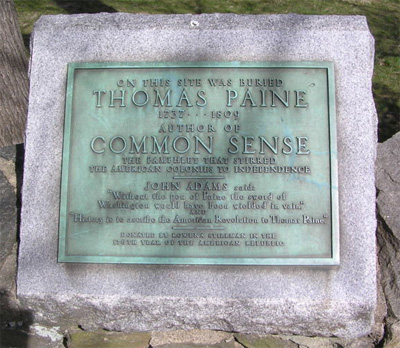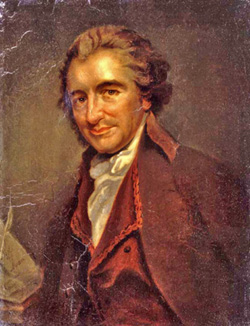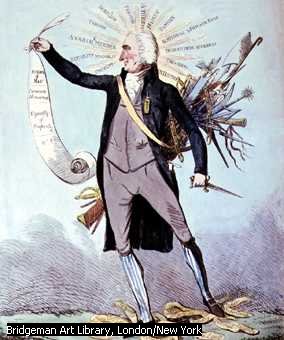“I have always regarded Thomas Paine as one of the greatest of all Americans. Never have we had a sounder intelligence in this republic.”
– Thomas Edison
 The burial location of Thomas Paine in New Rochelle, New York |
In Catholicism, when a child reaches seven years of age, they become responsible for their moral actions, capable of committing sin. Known as the “age of reason,” it is the time in a Catholic’s life when god starts keeping tabs on what they do.
Thomas Paine, in titling his 1794 scathing attack on Biblical scripture “The Age of Reason,” uses the term in a completely different sense. His use is a call for a higher reason, one that rejects the irrational and immoral lessons portrayed in the bible, which he calls the “pretend word of god.”
Paine’s work, a powerful indictment of the irrationality and immorality of the Bible, is still effective today; however, it also irrevocably destroyed his social standing. This man who composed Common Sense, the underground political pamphlet that was the inspiration for the American Revolution and made him a hero in America and Europe, suffered a complete reversal in public opinion with the publication of this book. He went from hero of the revolution to social pariah, ostracized. This man, whose countenance should have been reproduced in all major American cities and have a monument in Washington DC dedicated to his honor, instead was buried in an unassuming grave adorned with a simple plaque.
Paine, however, felt a responsibility to take the scripture to critical task, for all the damage he saw it inflict on society:
Whenever we read the obscene stories, the voluptuous debaucheries, the cruel and torturous executions, the unrelenting vindictiveness, with which more than half the Bible is filled, it would be more consistent that we called it the word of a demon, than the Word of God. It is a history of wickedness, that has served to corrupt and brutalize mankind; and, for my own part, I sincerely detest it, as I detest everything that is cruel.
Paine’s skepticism and questioning of religious authority was intertwined with his rebellious stance toward political authorities:
The intolerant spirit of church persecution had transferred itself into politics; the tribunals, stiled Revolutionary, supplied the place of an Inquisition; and the Guillotine of the Stake. I saw many of my most intimate friends destroyed; others daily carried to prison; and I had reason to believe, and had also intimations given me, that the same danger was approaching myself.
Paine was in jail for protesting the execution of Louis XVI when he wrote the first Part of the Age of Reason, facing execution, and did not have a Bible to reference during that time. When he obtained the use of a Bible for scribing the book’s second part, he found that the scripture is actually much worse than he remembered and that he has gone far too easy on it in the first part.
“I will not go out of the Bible for proof against the supposed authenticity of the Bible,” Paine informs his audience, “False testimony is always good against itself.” Paine never leaves the biblical text, and that gives his arguments their greatest strength. He doesn’t rely on any historical references outside of the bible beyond what we would consider common knowledge.
Take, for instance, Paine’s rebuttal of the Old Testament, Joshua 10:12-13, where god makes the sun fail to rise for one day:
This tale of the sun standing still upon Motint Gibeon, and the moon in the valley of Ajalon, is one of those fables that detects itself. Such a circumstance could not have happened without being known all over the world. One half would have wondered why the sun did not rise, and the other why it did not set; and the tradition of it would be universal; whereas there is not a nation in the world that knows anything about it.
This passage uses the absence of common knowledge to prove the Biblical lie. In this manner, anyone can take the “Age of Reason” and a copy of the Bible and look where Paine looks and see the contradictions, irrationality, and immorality that Paine identifies.
As we will see through Thomas Paine, the Bible incriminates itself, and a superior philosophy of life, based on Empiricism and an appreciation of the natural world, is there to fill the gap in meaning.
The Old Testament
 Statue of Thomas Paine Thetford, Norfolk, England. |
In the book of Numbers in the Old Testament, the Israelites, under Moses’ command, go to war with the Midianites. When the soldiers return victorious, Moses is enraged to find that the Israelites have spared the women and children. He then orders his troops to:
…kill every male among the little ones, and kill every woman that hath known man by lying with him. But all the women children, that have not known a man by lying with him, keep alive for yourselves. (Numbers 31:17-18)
The passage has led to some grevious rationalizations among Biblical apologists who actually try to defend Moses’ command. Paine, however, calls a spade a spade, “Here is an order to butcher the boys, to massacre the mothers, and debauch the daughters.” The Bible recounts the number of women raped at 32,000, meaning somewhere on the order of two to three times that many were slaughtered in captivity.
Paine asks us to consider this atrocity from the victim’s perspective:
Let any mother put herself in the situation of those mothers, one child murdered, another destined to violation, and herself in the hands of an executioner: let any daughter put herself in the situation of those daughters, destined as a prey to the murderers of a mother and a brother, and what will be their feelings? It is in vain that we attempt to impose upon nature, for nature will have her course, and the religion that tortures all her social ties is a false religion.
Paine takes many of the Old Testament’s cruel and inhumane acts to task. FromAbraham’s intention to sacrifice his son (Hebrews 11:17), the “two baskets full of children’s heads (Kings II 10:&),” and Bears devouring 42 children (Kings II 2:23-24), Paine’s catalogue of the Old Testament’s injustices support his thesis:
People in general know not what wickedness there is in this pretended word of God. Brought up in habits of superstition, they take it for granted that the Bible is true, and that it is good; they permit themselves not to doubt of it, and they carry the ideas they form of the benevolence of the Almighty to the book which they have been taught to believe was written by his authority. Good heavens! it is quite another thing, it is a book of lies, wickedness, and blasphemy; for what can be greater blasphemy, than to ascribe the wickedness of man to the orders of the Almighty!
Most interesting is Thomas Paine’s unique take on the book of Jonah, Paine actually treats the tale with respect, while many religious followers tend to dismiss it. This is because Paine finds a criticism of all the Prophets that have come before Jonah and the evil that they have wroght in the name of god. He finds gentiles who are forgiving in contrast to the vengful and cruel Hebrews. Paine appreciates Jonah’s status as a comical figure, and an important lesson on the entire Old Testament:
Here is both the winding up of the satire, and the moral of the fable. As a satire, it strikes against the character of all the Bible-prophets, and against all the indiscriminate judgements upon men, women and children, with which this lying book, the bible, is crowded; such as Noah’s flood, the destruction of the cities of Sodom and Gomorrah, the extirpation of the Canaanites, even to suckling infants, and women with child; because the same reflection ‘that there are more than threescore thousand persons that cannot discern between their right hand and their left,’ meaning young children,
applies to all their cases.As a moral, it preaches against the malevolent spirit of prediction; for as certainly as a man predicts ill, he becomes inclined to wish it. The pride of having his judgment right hardens his heart, till at last he beholds with satisfaction, or sees with disappointment, the accomplishment or the failure of his predictions.
Thanks to Paine, I think the book of Jonah may now be one of my favorite tales from the Bible.
For more Old Testament cruelty: the ABC’s of the Bible
The New Testament
 Thomas Paine |
“The sublime and the ridiculous are often so nearly related that it is difficult to class them separately.”
– Thomas Paine
I once had a Christian friend criticize my interest in Science. “What’s science,” he said, “but one guy saying ‘I saw this,’ and another guy saying, ‘Yeah, I saw it too?’” I was too put off to respond, but this was not Science at all. Science is one person saying, “This is what I saw. This is how I saw it. Go take a look for yourself.” The stories from the Bible are the ones that ask us to take their word for it.
Thomas Paine takes issue with the whole concept of revealed religion for this very reason. If someone were to relate as a personal experience any of the events in the Bible to us, we would be highly skeptical. Why then, when we put these same fantastic accounts in an ancient text based on the oral histories of primitive cultures, do we suddenly give them credit?
One of Paine’s best examples of the absurdity of Biblical revelation comes with his criticism of this New Testament passage:
The tombs broke open and the bodies of many holy people who had died were raised to life. They came out of the tombs, and after Jesus’ resurrection they went into the holy city and appeared to many people. (Matthew 27:52-53)
Paine has some amusing questions concerning these holy ghosts:
It is an easy thing to tell a lie, but it is difficult to support the lie after it is told. The writer of the book of Matthew should have told us who the saints were that came to life again, and went into the city, and what became of them afterwards, and who it was that saw them; for he is not hardy enough to say that he saw them himself; — whether they came out naked, and all in natural buff, he-saints and she-saints, or whether they came full dressed, and where they got their dresses; whether they went to their former habitations, and reclaimed their wives, their husbands, and their property, and how they were received; whether they entered ejectments for the recovery of their possessions, or brought actions of crim. con. against the rival interlopers; whether they remained on earth, and followed their former occupation of preaching or working; or whether they died again, or went back to their graves alive, and buried themselves.
Paine, being a Naturalist, takes offense at the uselessness of this myth. The sole purpose in adding this detail to the tale of Jesus’ resurrection is to exaggerate it, make it more fantastic. Ironically, it is this embellishment that makes the story so irresistible for believers. Paine takes issue with the uselessness of bringing up this detail:
Strange indeed, that an army of saints should return to life, and nobody know who they were, nor who it was that saw them, and that not a word more should be said upon the subject, nor these saints have any thing to tell us! Had it been the prophets who (as we are told) had formerly prophesied of these things, they must have had a great deal to say. They could have told us everything, and we should have had posthumous prophecies, with notes and commentaries upon the first, a little better at least than we have now. Had it been Moses, and Aaron, and Joshua, and Samuel, and David, not an unconverted Jew had remained in all Jerusalem. Had it been John the Baptist, and the saints of the times then present, everybody would have known them, and they would have out-preached and out-famed all the other apostles. But, instead of this, these saints are made to pop up, like Jonah’s gourd in the night, for no purpose at all but to wither in the morning. — Thus much for this part of the story.
Thomas Paine is like a hard science fiction writer, demanding the details that would flesh out the fantasy and allow the reader to maintain their suspension of disbelief, but the revealed religion reveals nothing. All we have is what the text gives us and nothing more. We will never learn anything through historical investigations that will refine the level of detail the New Testament gives us concerning the undead Saints.
Science, on the other hand, will always yield more detail and deeper understanding, as Paine explains.
Deism
 Thomas Paine |
A friend of mine once asked, “Why should literacy be a requirement for salvation?” Thomas Paine raises this and many other criticisms of the idea that god would use something as subject to interpretation and falsifiable as the written word to convey its message. Not to mention using such a contradictory and unconvincing text as the Bible.
Paine has argued convincingly throughout The Age of Reason for abandoning the Bible as a source of truth and meaning in life. Instead, he points to a scripture beyond the reach of human meddling, something people can independently verify for themselves instead of relying on the word of prophets whose intentions we cannot know, reality:
The creation is the Bible of the deist. He there reads, in the hand-writing of the Creator himself, the certainty of his existence, and the immutability of his power; and all other Bibles and Testaments are to him forgeries.
Unlike the cruelties the Old Testament forces us to rationalize, and the embellishments the New Testament forces the believer to accept, science and humanism wholly coincide with the reality surrounding and within us. Studying the wonders of nature improves our understanding of ourselves, allows us to improve ourselves and makes our lives easier:
Could a man be placed in a situation, and endowed with power of vision to behold at one view, and to contemplate deliberately, the structure of the universe, to mark the movements of the several planets, the cause of their varying appearances, the unerring order in which they revolve, even to the remotest comet, their connection and dependence on each other, and to know the system of laws established by the Creator, that governs and regulates the whole; he would then conceive, far beyond what any church theology can teach him, the power, the wisdom, the vastness, the munificence of the Creator. He would then see that all the knowledge man has of science, and that all the mechanical arts by which he renders his situation comfortable here, are derived from that source: his mind, exalted by the scene, and convinced by the fact, would increase in gratitude as it increased in knowledge: his religion or his worship would become united with his improvement as a man: any employment he followed that had connection with the principles of the creation, — as everything of agriculture, of science, and of the mechanical arts, has, — would teach him more of God, and of the gratitude he owes to him, than any theological Christian sermon he now hears. Great objects inspire great thoughts; great munificence excites great gratitude; but the groveling tales and doctrines of the Bible and the Testament are fit only to excite contempt.
The Bible offers immortality, life after death, but it also demands we cease growing. It demands we accept it like a child, unthinkingly. This is stasis, Paine recognizes, and argues that by studying nature, we find a lifetime of renewal and satisfying exploration:
To be happy in old age it is necessary that we accustom ourselves to objects that can accompany the mind all the way through life, and that we take the rest as good in their day. The mere man of pleasure is miserable in old age; and the mere drudge in business is but little better: whereas, natural philosophy, mathematical and mechanical science, are a continual source of tranquil pleasure, and in spite of the gloomy dogmas of priests, and of superstition, the study of those things is the study of the true theology; it teaches man to know and to admire the Creator, for the principles of science are in the creation, and are unchangeable, and of divine origin.
Those who knew Benjamin Franklin will recollect, that his mind was ever young; his temper ever serene; science, that never grows grey, was always his mistress. He was never without an object; for when we cease to have an object we become like an invalid in an hospital waiting for death.
Science goes on forever. It doesn’t stop within the finite pages of a book written by men. Thomas Paine argued for appreciating the infinite beauty of reality, to find joy and meaning in its complexity and wonder:
The Bible of the creation is inexhaustible in texts. Every part of science, whether connected with the geometry of the universe, with the systems of animal and vegetable life, or with the properties of inanimate matter, is a text as well for devotion as for philosophy — for gratitude, as for human improvement. It will perhaps be said, that if such a revolution in the system of religion takes place, every preacher ought to be a philosopher. Most certainly, and every house of devotion a school of science.